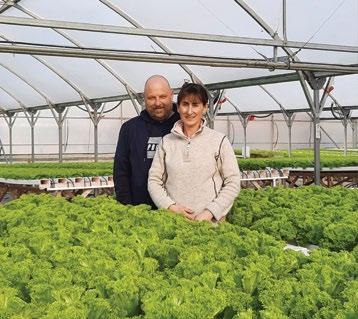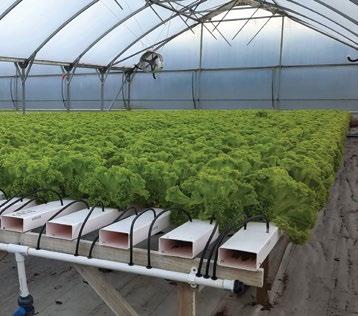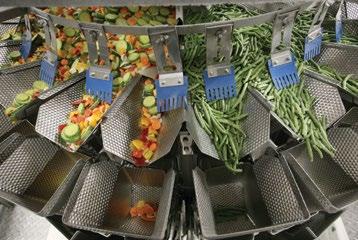
4 minute read
Getting it right with greens
GETTING IT RIGHT
WITH GREENS
Words by Helena O’Neill

Dale and Hannah Jordan bought Saddleview Greens nine years ago and now grow hydroponic lettuce, spinach and kale for the local market
The move to horticulture nearly a decade ago has given an Otago couple new opportunities and challenges.
Dale and Hannah Jordan bought Saddleview Greens nine years ago, growing hydroponic lettuce, spinach and kale for the local market.
“This place popped up … we hummed and hawed for about a year and decided to jump in. We’re a lot better off now, being able to tend to the kids as we work from home,” Dale says.
The couple had never before worked in horticulture or hydroponics, so it was a big move to take over the operation at Wingatui, near Dunedin.
“I knew nothing about hydroponics at all, let alone lettuce, when we bought the place. It’s been a big learning curve.”
In peak season the Jordans grow green frilly, red frilly, red oak, cos and butterhead lettuces. In the cooler months, the business grows green frilly, cos and red oak lettuces, with the latter mostly used for the mixed salad bags.
“The cos can be quite popular, although we can’t grow it very big this time of year.The beauty of hydroponic lettuces is that they’re very clean.You can use every leaf off the lettuce, and I think people like that, especially this time of year.” They also grow one variety each of spinach and kale all year round.
Spinach and kale have grown in popularity over the years, with orders between five to 10 crates a week when they first took over the business, rocketing to between 20 and 30 crates a day.
“It [spinach] grows really, really fast in the summer. With the speed of growth being so fast it doesn’t have a long shelf-life.”
The business supplies MG Marketing and restaurants through Dunedin-based Kaan’s Catering Supplies, along with their local supermarket Mosgiel New World.
One of the major challenges facing the business this year has been the low sunshine hours.
“It’s really hard to get it right.”
“We did throw a lot of lettuce out last year. We’re going to be a bit more organised next year because we have a bit more authority on how our seedlings get planted by Zealandia in Christchurch. We know what the delivery date is going to be now, so we can be better organised about what’s coming.”
“I've been of the opinion that it's much better to have too much than not enough, and if I end up throwing things out then that’s just part and parcel of how it works.
During spring and summer, the growth is really fast and sometimes the market is not going as fast as it could be. You end up throwing stuff out.”
While last year’s lockdown and Covid-19 restrictions negatively impacted sales, it was also a chance to slow down and have a good look at the business, Dale says. A run of fine weather during lockdown was a bonus too.
“The sales we were making during that three or four-month period were almost not viable for us to stay open. We did get that wage subsidy from the government, and I took it as a time to chill out a wee bit and didn’t feel a pressure to perform every day.”
“We were locked down in April and May – normally our two busiest months of the year. During spring, there was no tourism happening and the restaurant market was dead, so we were still throwing stuff out right up to the week before Easter.”
“It was about two benches a day for three or four months. It was a lot of lettuce.”
The latest government plans to phase out fruit stickers by 2023, introduce the Clean Car Discount scheme (the ute tax), and implement three sets of legislation to replace the Resource Management Act (RMA), is all adding to the mounting pressure on industry.
“It’s getting harder and harder every year to grow. The government is putting a lot of pressure on farmers and growers of all kinds.”
“Even with the wage increases every year for the last three years, all our suppliers within a week of it happening have emailed us saying that their costs are going up. Our wage costs have gone up also, but I can’t just jump on the bandwagon and say ‘right, that’s it, our lettuces are $3.50 now.’ People wouldn’t buy them, they’re just not a necessity.”
“We have to try and wear it from both sides. The profit is getting less and less every year.”
Hannah, who deals with the administration side of things, says that as a small grower, the required compliance is huge.
“We are audited the same way a large grower is. Compliance can take a large amount of time to complete, and we have just five staff,” Hannah says.
While unsure how the government can reduce the pressure and costs associated with compliance, Hannah and Dale say something needs to change.
Packaging Solutions designed for your business

Across industries and applications, we design specialised solutions.
Bringing together leading brands in weighing and packaging equipment for the food industry. Our solutions set the standard for yield, efficiency, and safety across a wide range of industries. Whatever your product needs, we can meet it with precision and passion.










